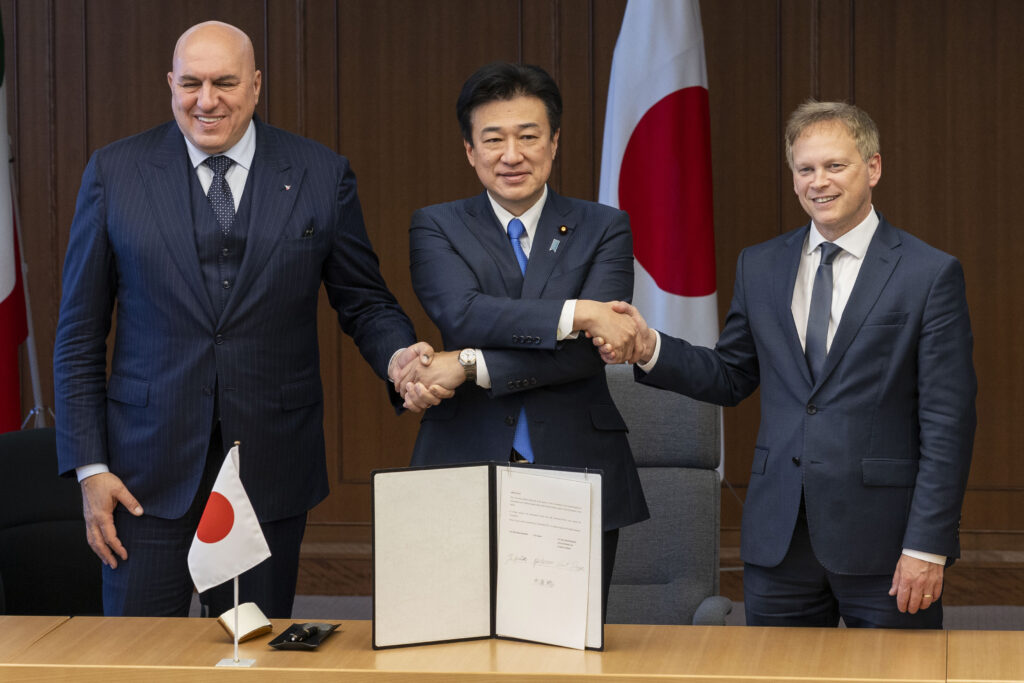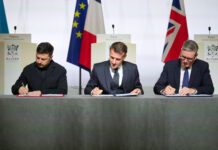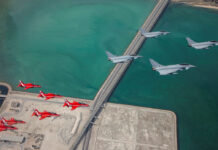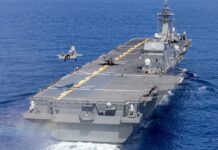
UK, Italy and Japan sign landmark treaty advancing Global Combat Air Programme
Peter Felstead
The United Kingdom, Italy and Japan signed an international treaty on 14 December 2023 that marks a key stage of the landmark Global Combat Air Programme (GCAP).
GCAP, which merges the UK-initiated Tempest programme with Japan’s effort to develop a next-generation fighter, aims to produce a sixth-generation fighter that will take to the skies by 2035.
It was also decided under the treaty that the headquarters of the programme will be based in the UK, while the first CEO for the programme will come from Japan.
Meanwhile, a new joint business construct will be headquartered in the UK that will oversee support and timely delivery of the programme, with the first head of this organisation coming from Italy.
UK Defence Secretary Grant Shapps met with his Japanese and Italian counterparts, Minister Minoru Kihara and Minister Guido Crosetto, in Tokyo to sign the treaty, which comes a year after the formal launch of GCAP and “highlights the positive progress in the development of this next-generation fighter jet” the UK Ministry of Defence (MoD) stated in a press release.
The joint development phase of the programme is due to launch in 2025.
According to the UK MoD the supersonic stealth jet produced under GCAP “aims to harness next-generation technologies and become one of the world’s most advanced, interoperable, adaptable and connected fighter jets in service globally”. Among its capabilities the jet “will boast a powerful radar that can provide 10,000 times more data than current systems, giving a battle-winning advantage”, the MoD noted.
Within the UK, the GCAP effort is being led by BAE Systems in close partnership with Rolls-Royce, Leonardo UK and MBDA UK. Together, they are working closely with lead companies from Japan and Italy, chiefly Mitsubishi Heavy Industries and Leonardo respectively, to progress the design and development of the aircraft.
“Our world-leading combat aircraft programme aims to be crucial to global security and we continue to make hugely positive progress toward delivery of the new jets to our respective air forces in 2035,” Shapps was quoted as saying by the MoD. “The UK-based headquarters will also see us make important decisions collaboratively and at pace, working with our close partners Italy and Japan, and our impressive defence industries, to deliver an outstanding aircraft.”

“A crucial programme for the future of stability in the Euro Atlantic, Indo-Pacific and wider global security, GCAP is a strong example of the UK’s global leadership in developing next-generation military capability to deter and defeat threats to the UK and our allies,” the UK MoD stated in its press release. “It is another demonstration of our commitment to Indo-Pacific security, following the deployment of the Royal Navy’s Carrier Strike Group in 2021, with a further deployment coming in 2025, as well as the navy maintaining a persistent presence in the region through [the offshore patrol vessels] HMS Spey and HMS Tamar.”










![The Combat Air Flying Demonstrator: Rehearsing and preparing for GCAP These These images of Tempest studies do not represent an evolution, since several of them were undertaken in parallel. They do represent different emphases on elements of the requirement. The first to be seen was the ‘Pregnant Pelican’, as unveiled at Farnborough in 2018. The Concept Class Five aircraft was unveiled at Farnborough in 2022, while the Lambda-winged aircraft (the P189-17B) was first seen at DSEI Japan the following year. The so-called ‘Big Delta’ was revealed at Farnborough in 2024. [BAE Systems; Ministère des Armées/SITTA]of Tempest studies do not represent an evolution, since several of them were undertaken in parallel. They do represent different emphases on elements of the requirement. The first to be seen was the ‘Pregnant Pelican’, as unveiled at Farnborough in 2018. The Concept Class Five aircraft was unveiled at Farnborough in 2022, while the Lambda-winged aircraft (the P189-17B) was first seen at DSEI Japan the following year. The so-called ‘Big Delta’ was revealed at Farnborough in 2024. [BAE Systems; Ministère des Armées/SITTA]](https://euro-sd.com/wp-content/uploads/2025/09/7D-RS171720_2620-LONDON-24-IMAGE-01-2-Kopie-218x150.jpg)
![Strategic shift: UK CSG deployment demonstrates switch in UK strategic focus The UK aircraft carrier HMS Prince of Wales (foreground) sails alongside the US carrier USS George Washington during Australia’s ‘Talisman Sabre’ exercise in July 2025. The two carrier strike groups (CSGs), plus Australian Navy assets, conducted CSG integration activities. [Crown copyright 2025]](https://euro-sd.com/wp-content/uploads/2025/09/1-PWLS-GW-TSabre-CC-UK-MoD-25-Kopie-218x150.jpg)

